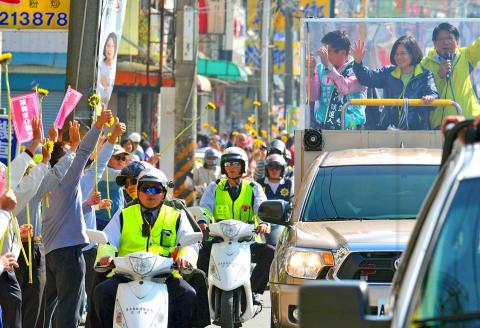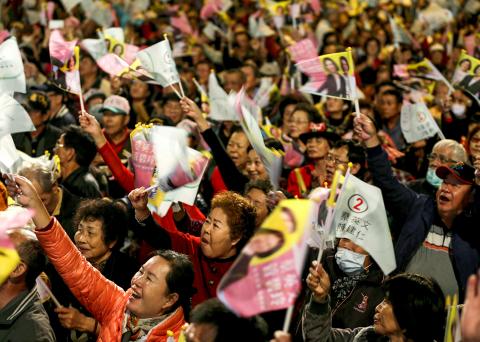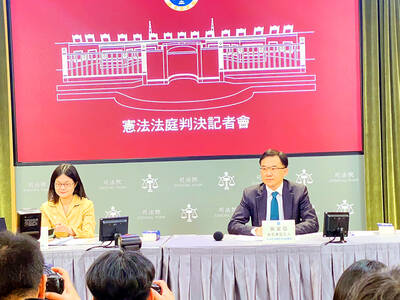Amid good-luck wishes yesterday from people in Fenggang Village (楓港) in Pingtung County’s Fangshan Township (枋山), her parents’ home town, Democratic Progressive Party (DPP) presidential candidate Tsai Ing-wen (蔡英文) paraded through Pingtung and Kaohsiung, greeted by supporters along the way, launching her final-week nationwide campaign tour before the presidential election on Saturday.
“Four years ago, I started my presidential campaign trip along Provincial Highway No. 1 from Fenggang. Four years later, I have returned to my hometown, Pingtung. From here I will start my week-long campaign trip,” Tsai told more than 100 people in the small coastal village with a population of a little over 1,000 who gathered in front of the local Delong Temple (德隆宮). “I could feel the desire of the people in Pingtung to elect a president from here.”
“Please give me the best election outcome,” Tsai said, urging her supporters to also support the DPP’s district and legislator-at-large candidates.

Photo: AFP / Sam Yeh
Among the supporters, Tsai’s uncle, aunt and cousin were also in attendance. Her uncle and aunt brought Tsai a gift of zongzi (粽子, rice dumplings), which symbolize victory in Taiwanese culture.
Prior to Tsai’s arrival, the temple leaders walked around the facility to make sure that everything was well prepared “to welcome our President Tsai.”
Before speaking to the crowd, Tsai went into the temple to make offerings to the deities.

Photo: EPA / Ritchie B. Tongo
The temple master gave Tsai a flag with the temple’s and the deity’s name on it to express their goodwill, while two Paiwan leaders presented traditional headwear and a vest with a totem to recognize her as a “daughter of the Paiwan people,” as her grandmother was a Paiwan Aborigine.
Following a rally to launch the nationwide tour, Tsai, accompanied by DPP legislative candidate Chung Chia-pin (鍾佳濱) and Pingtung County Commissioner Pan Meng-an (潘孟安), paraded through Linluo Township (麟洛) and neighboring Pingtung City.
“Dear friends and fellow Pingtung residents, Tsai Ing-wen is here in person, greeting all of you,” a campaigner said through loudspeaker.
“Please vote for Tsai to make Pingtung the home county of the president,” the campaigner said.
The announcements were made in Hakka while the parade was in Linluo, as it is a predominantly Hakka township, and switched to Hoklo (commonly known as Taiwanese) as the parade crossed into Pingtung City, which is a predominantly Hoklo-speaking area.
Supporters gathered in groups along the parade route, waving flags, giving the thumbs-up gesture and screaming as the jeep carrying Tsai, Chung and Pan passed by.
“Mom, Tsai is coming. Look, I see her,” shouted a girl who stood outside a restaurant with her family waiting for the parade to pass, pointing to the direction that Tsai was coming from.
After the parade in Pingtung, Tsai accompanied the DPP’s Kaohsiung legislative candidates in a parade through the city and finished the day with an evening rally in Kaohsiung, which event organizers said had a turnout of 100,000 people.

The US government has signed defense cooperation agreements with Japan and the Philippines to boost the deterrence capabilities of countries in the first island chain, a report by the National Security Bureau (NSB) showed. The main countries on the first island chain include the two nations and Taiwan. The bureau is to present the report at a meeting of the legislature’s Foreign Affairs and National Defense Committee tomorrow. The US military has deployed Typhon missile systems to Japan’s Yamaguchi Prefecture and Zambales province in the Philippines during their joint military exercises. It has also installed NMESIS anti-ship systems in Japan’s Okinawa

TRAGEDY STRIKES TAIPEI: The suspect died after falling off a building after he threw smoke grenades into Taipei Main Station and went on a killing spree in Zhongshan A 27-year-old suspect allegedly threw smoke grenades in Taipei Main Station and then proceeded to Zhongshan MRT Station in a random killing spree that resulted in the death of the suspect and two other civilians, and seven injured, including one in critical condition, as of press time last night. The suspect, identified as a man surnamed Chang Wen (張文), allegedly began the attack at Taipei Main Station, the Taipei Fire Department said, adding that it received a report at 5:24pm that smoke grenades had been thrown in the station. One man in his 50s was rushed to hospital after a cardiac arrest

ON ALERT: Taiwan’s partners would issue warnings if China attempted to use Interpol to target Taiwanese, and the global body has mechanisms to prevent it, an official said China has stationed two to four people specializing in Taiwan affairs at its embassies in several democratic countries to monitor and harass Taiwanese, actions that the host nations would not tolerate, National Security Bureau (NSB) Director-General Tsai Ming-yen (蔡明彥) said yesterday. Tsai made the comments at a meeting of the legislature’s Foreign Affairs and National Defense Committee, which asked him and Minister of National Defense Wellington Koo (顧立雄) to report on potential conflicts in the Taiwan Strait and military preparedness. Democratic Progressive Party (DPP) Legislator Michelle Lin (林楚茵) expressed concern that Beijing has posted personnel from China’s Taiwan Affairs Office to its

‘ILLEGAL RULING’: The KMT and the TPP slammed the Constitutional Court judgement, saying it contravened the law and was trying to clear the way for a ‘green dictatorship’ The Constitutional Court yesterday ruled that amendments to the Constitutional Court Procedure Act (憲法訴訟法) passed by the Legislative Yuan last year are unconstitutional, as they contravene due legislative process and separation of powers. The Legislative Yuan on Dec. 20 last year passed amendments stipulating that no fewer than 10 grand justices must take part in deliberations of the Constitutional Court, and at least nine grand justices must agree to declare a law unconstitutional. The Executive Yuan on Jan. 2 requested that lawmakers reconsider the bill, but the Legislative Yuan, under a combined majority of Chinese Nationalist Party (KMT) and Taiwan People’s Party